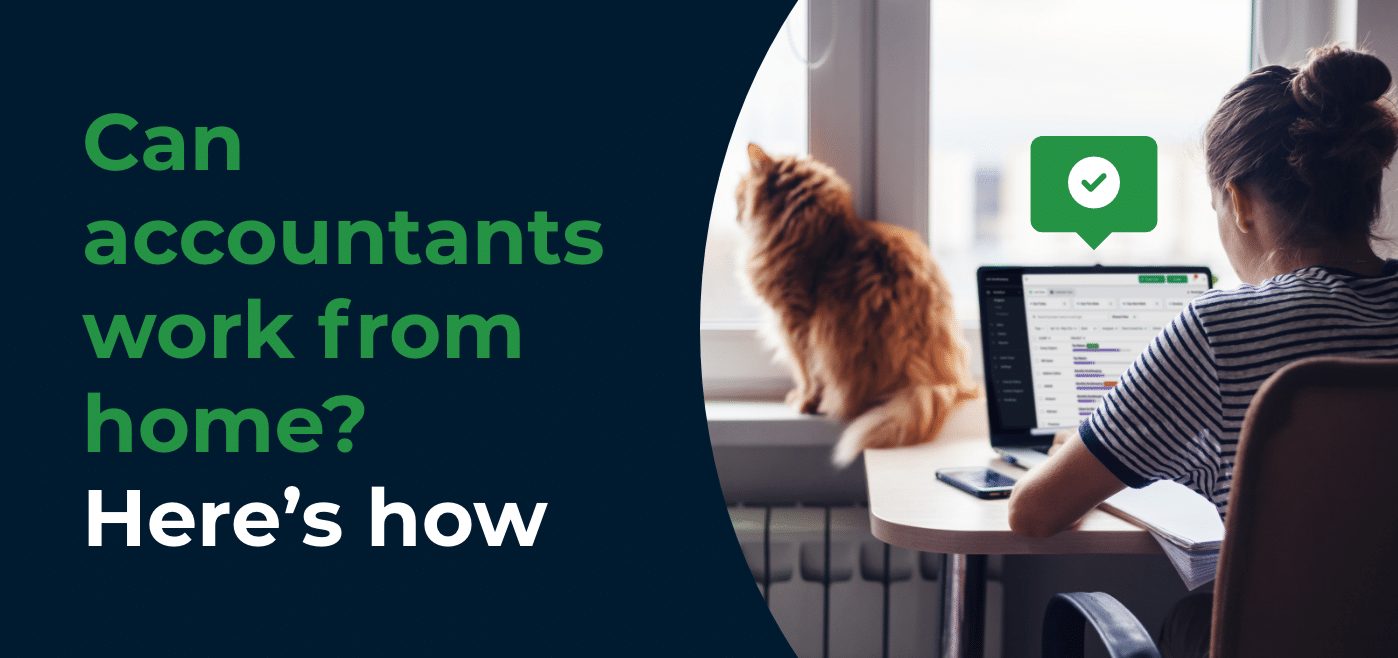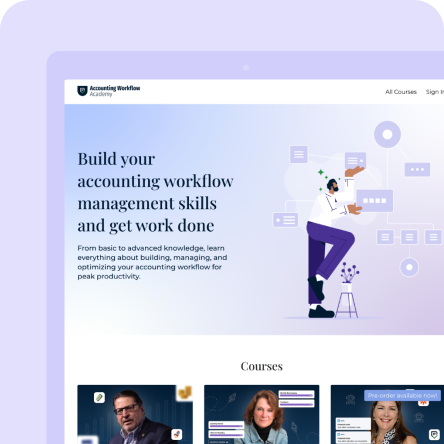The trend of accountants working from home started long before 2020 and isn’t going anywhere.
Accounting firms that require employees to report to the office are now in the minority. Nearly three-quarters of accounting firms offer flexible work options, and only 8% of firms ask their entire staff to work in the office.
Accounting/Finance is now the sixth most popular industry for remote work with hybrid or fully virtual work options for CPAs, tax preparers, bookkeepers, and auditors. All types of companies from small firms to staffing agencies to big four accounting firms are re-evaluating their working models to accommodate this new type of work.
How to Build a Remote Accounting Firm
As your own boss, you can work wherever you choose, however you choose. Why not extend that benefit to your entire team? Because of this industry-wide shift to hybrid and remote-friendly work workplaces, accounting firms should consider flexible options to attract and retain talented employees.
If you’re a solopreneur getting ready to launch your business or make your first hire, you have the benefit of building your business with a remote-first model.
If you already have an accounting practice but want to make a shift to a virtual firm, build your infrastructure and remote culture up first until you can make a smooth transition. For instance, make sure you have the tools you need for your team to work from home. Experiment with a hybrid model or have your team work from home one day a week and collect feedback before switching to 100% virtual.
Can Accountants Work from Home: Pros and Cons of Working from Home as an Accountant
While working from home may seem dreamy, the reality is a little more nuanced. Consider these top benefits and challenges remote accountants face to help you decide if remote work is right for you.
Benefits of Working from Home
-
Work/life balance.
According to Zippia, 75% of employees believe they have a better work-life balance when working remotely. Accounting work can be demanding, especially during tax season. Even if you have an office space, it’s important to be able to work from home when needed so you don’t miss out on life’s most important moments.
-
Better productivity.
Financial Cents clients estimate that they save 14 hours per week per employee with remote accounting software. That doesn’t even count the hours they get back by cutting out a commute and unnecessary meetings.
-
Cost savings.
Commercial real estate is expensive, along with everything that goes with it: equipment, cleaning costs, and parking. While working at home still has a price tag, it’s much lower than an office lease or virtual office costs.
-
Improved collaboration.
Because remote work takes intentionality rather than relying on natural conversations, it can actually result in better communication.
Working from home as an accountant has a unique value proposition. You can be more productive and create balance, but it doesn’t work for everyone. Talk to accountants who have already made the switch or try working a few days a week from home first to make sure it will be a good fit.
Everything You Need to Work from Home as an Accountant
Getting started working from home as an accountant isn’t as difficult as you might think. More than two-thirds (67%) of financial services companies said that technology to support a hybrid work model would pose only a minor challenge.
All you need to work from home is a space to work, a way to communicate, and an infrastructure to securely manage your documents and work. Let’s look at how to establish your virtual accounting setup in five simple steps.
- Set up your home office
- Set up information security controls
- Invest in accounting practice management software
- Leverage productivity tools
- Establish rhythms for yourself
1. Set up your Home Office
First, set up a space where you can work. This doesn’t need to be fancy (you don’t technically need a desk!), but you do need a space you can be productive. If you live with family or roommates, make sure that you have a quiet, separate space where you can focus and do calls without interruption.
Of course, the most important things you need are high-speed internet and a laptop or desktop computer. If you’re a remote employee or contractor, check with your company to see what equipment or home office stipend they offer. Here are some other items you may want to consider:
- A second monitor
- An ergonomic chair
- A standing desk
- A printer/scanner
- Filing cabinets or other lockable space
2. Set up Information Security Controls
Safeguarding your clients’ confidential information is one of the biggest challenges that accountants face. It’s not only a good business practice—it’s a requirement.
If you’re a remote employee, your company should issue you a device with the data protection and protocols you need. It’ll be your responsibility to use common-sense practices like avoiding public WiFi and securing your device when you’re not working.
As a solopreneur, determining how to secure your clients’ data is a much larger task. Since you need to choose and maintain your entire tech stack without an IT department, follow these principles to get started.
- Build in the cloud. Choosing cloud-based software and file storage is the simplest way to secure your data. Most software programs offer encryption, automatic backups, and multi-touch authentication to minimize data breaches. They roll out security updates automatically so you aren’t left exposed until you upgrade.
- Create a Written Information Security Plan (WISP). In the U.S., accounting firms of any size are required to have a written strategy outlining how they protect client data. This document will outline who has access to sensitive data, where it’s stored, any known risks, and outline your security measures. You can use a sample WISP from the IRS to get started.
- Get expert help. While you might be small, you aren’t alone when it comes to data security. Invest in training for yourself and your team to avoid things like phishing scams. You can also contract a cybersecurity company to install the latest anti-virus software, assess vulnerabilities, and step in to help if you have a breach.
3. Invest in Accounting Practice Management Software
Accountants find themselves pulled in many directions: preparing returns, reviewing returns, sending emails, chasing down signatures, and checking in with their team. Losing track of a work or missing a deadline would be disastrous.
To sync your team and get a picture of what you need to accomplish in the next day, week, or month, you need accounting practice management software. Here are the top features to look for in an accounting practice management software to save you time and keep organized.
- Secure document storage to house documents in one centralized place
- Workflow management to track the status of client work and upcoming deadlines. Look for a tool with subtasks and dependencies to notify team members when one step is complete so another can begin.
- Workflow templates to create and track common tasks from a library
- Client management tools like onboarding checklists and requesting documents and signatures with automated text and email reminders
- Capacity management to assign tasks and make sure you don’t overload your team
4. Leverage Productivity Tools
Since you have less structure and accountability working from home (but also less office noise and distractions!), productivity tools can set you on a path to success.
Get into Focus Mode
Focus apps like Be Focused, Freedom, or Forest block distractions to help you enter deep work mode. Music apps and instrumental playlists are another great way to enhance your productivity.
Communicate Effectively
Popular communication tools like Slack, Zoom, or Google Meet can connect you to your clients for better relationships and teammates so you don’t feel isolated. But they aren’t enough on their own.
Accountants burn hours digging for emails in inboxes and sending manual emails that could have been automated. By using accounting management software with collaboration features integrated with email, you can keep all your communication in one place. Make notes on a project, tag teammates, and turn emails into tasks to save yourself time.
Analyze your Time Spent
Whether you use a free tool like Toggl or a time tracker built into your accounting management software, you create a goldmine of data to improve your productivity. Analyze your time spent each month to see what tasks or clients drained the most of your time and what your most and least profitable projects were.
5. Establish Rhythms for Yourself
Beyond your tools, it’s important to set healthy practices to separate your work life from your personal time. You need self-discipline to meet deadlines, set boundaries, and unplug at the end of the day. Try giving yourself a schedule to structure your days and provide enough time to manage your task load.
Since you’re at home, try a workout, cook lunch, or walk the dog to break up the day and refresh your productivity. Practice open communication with your spouse and caregivers to make sure that everyone has a clear understanding of when you are or aren’t available.
How One Accountant Works from Home with Financial Cents
When Christi’s accounting practice had to shut its office not once, but twice, during the COVID-19 pandemic, the transition was seamless thanks to the tools they had in place.
“Financial Cents held not just my brain and not just my to-do list, but everybody on my team. I had everything I needed right at my fingertips with absolutely zero transition time,” she shared. “Truly, if there’s one piece of software outside of my tax software and QuickBooks that I could not live without, it’s Financial Cents.”





